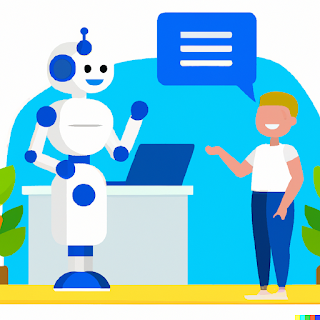Chatbots are increasingly becoming a popular way for businesses to automate customer service and improve user experience. These AI-powered assistants are designed to help users with their inquiries, provide support, and even complete transactions without the need for human intervention. However, as chatbots continue to become more prevalent, it is crucial to address the ethical concerns surrounding their use. In this blog post, we will explore the importance of balancing automation and human interaction in chatbots, the ethical considerations for their use in customer service, the future of AI ethics in chatbots, the role of ethics in their design and development, and the need to ensure ethical use of chatbot technology.
Balancing Automation and Human Interaction in AI Ethics:
Chatbots have the potential to improve customer experience and
increase efficiency. However, ethical implications need to be
considered when deploying them. The over-reliance on automation in chatbots can
lead to a lack of empathy and understanding, which can result in poor user
experience. Therefore, it is essential to balance automation with human
interaction to ensure ethical chatbot design and deployment.
 |
| AI-generated chatbot prioritizes empathy and humanization to improve its effectiveness and ethical implications. |
To achieve this balance, tech companies need to focus on the role of human interaction in the design and deployment of chatbots. By incorporating empathy and humanization in their design, chatbots can become more effective and create better user experiences. This balance is critical to avoid negative implications on customer experience and to ensure that AI technology does not compromise the ethical standards of the business.
Ethical Considerations for AI Chatbots in Customer Service:
The importance of empathy in chatbots for customer service cannot
be overstated. Customer service is an area where chatbots are being
increasingly deployed. While it is essential to automate customer service
inquiries, chatbots must be designed and deployed with empathy and
consideration for the end users. In addition, chatbot technology must respect
user privacy, data security, and the principles of informed consent.
Furthermore, businesses must ensure that chatbots are not being
used to replace human customer service representatives entirely. It is
essential to balance automation with human interaction to ensure the ethical use of
chatbot technology in customer service settings.
The Future of AI Ethics in Chatbots
As the use of chatbots continues to grow and evolve, it's
important to anticipate and address future ethical concerns in their development
and deployment. One area of concern is the potential for chatbots to further
perpetuate biases and inequalities in society. For example, if a chatbot is
programmed with biased data, it may provide discriminatory responses to certain
groups of people. To prevent this, companies need to be vigilant in the
collection and use of data to ensure that their chatbots do not perpetuate
existing biases and inequalities.
Another concern is the potential for chatbots to further erode
human connections and interactions. As chatbots become more advanced and
capable of handling complex tasks, they may replace more and more human
interactions in various industries. To prevent this, companies can focus on
designing chatbots that enhance and complement human interactions, rather than
replace them.
The Role of Ethics in the Design and Development of AI Chatbots
The design and development of AI chatbots should always consider ethical considerations. This includes ensuring that chatbots are
designed to be safe, reliable, and accurate and that they do not perpetuate
biases or discriminate against certain groups of people. Tech companies have a
responsibility to ensure that their chatbots are ethically designed and
deployed and that they are transparent with their customers about how their
chatbots work and what data they collect.
Best practices for ensuring ethical chatbot design and deployment
include involving diverse teams in the design process, testing chatbots
rigorously to identify and address potential ethical issues, and building mechanisms for feedback and continuous improvement.
Humanizing AI Chatbots: Why It Matters
One way to improve the ethical implications of chatbots is to
focus on humanizing them. This means designing chatbots to be more relatable
and empathetic to users, and ensuring they are easy to use and understand.
By humanizing chatbots, companies can improve their effectiveness and increase
user satisfaction, while also addressing ethical concerns related to automation
and human interaction.
Strategies for humanizing AI chatbots include incorporating more
natural language processing, using conversational interfaces, and providing
users with more personalized responses. It's also important to design chatbots
that can recognize and respond appropriately to emotional cues from users, such
as frustration or confusion.
Ensuring Ethical Use of Chatbot Technology
Finally, it's important to ensure that chatbot technology is used
ethically in various industries and contexts. This includes addressing ethical
challenges related to chatbot design and deployment in different sectors, such
as healthcare, finance, and education. Regulatory bodies can also play a role
in ensuring that chatbot technology is used ethically and responsibly, by
establishing guidelines and standards for chatbot development and deployment.
Ultimately, the ethical use of chatbot technology requires ongoing
consideration and effort from tech companies, regulatory bodies, and society.
Conclusion
In conclusion, chatbots are becoming increasingly prevalent in
various industries and contexts, and it's important to address the ethical
implications of their design and deployment. Balancing automation and human
interaction, ensuring empathy and personalization, and addressing potential
biases and discrimination are all key considerations for ensuring ethical
chatbot design and deployment. By continuing to focus on these areas, we can
ensure that chatbot technology is used ethically and responsibly, to the benefit
of both users and society as a whole.
Stay updated on the latest developments in chatbot technology and ethics by checking out our The Ethics of AI: A Deep Dive into the Pros and Cons of Artificial Intelligence in Healthcare blog posts. Share your thoughts and insights in the comments and engage with our community of tech-savvy individuals.
To learn more about the ethical considerations of AI chatbots, check out this comprehensive report from the National Institute of Standards and Technology.